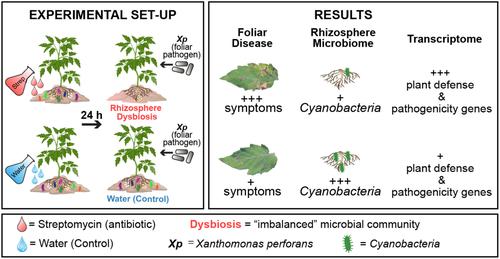当前位置:
X-MOL 学术
›
Environ. Microbiol.
›
论文详情
Our official English website, www.x-mol.net, welcomes your
feedback! (Note: you will need to create a separate account there.)
The underground world of plant disease: Rhizosphere dysbiosis reduces above‐ground plant resistance to bacterial leaf spot and alters plant transcriptome
Environmental Microbiology ( IF 4.3 ) Pub Date : 2024-07-16 , DOI: 10.1111/1462-2920.16676 Toi Ketehouli 1 , Josephine Pasche 1 , Victor Hugo Buttrós 1 , Erica M Goss 1, 2 , Samuel J Martins 1
Environmental Microbiology ( IF 4.3 ) Pub Date : 2024-07-16 , DOI: 10.1111/1462-2920.16676 Toi Ketehouli 1 , Josephine Pasche 1 , Victor Hugo Buttrós 1 , Erica M Goss 1, 2 , Samuel J Martins 1
Affiliation

|
Just as the human gut microbiome is colonized by a variety of microbes, so too is the rhizosphere of plants. An imbalance in this microbial community, known as dysbiosis, can have a negative impact on plant health. This study sought to explore the effect of rhizosphere dysbiosis on the health of tomato plants (Solanum lycopersicum L.), using them and the foliar bacterial spot pathogen Xanthomonas perforans as model organisms. The rhizospheres of 3‐week‐old tomato plants were treated with either streptomycin or water as a control, and then spray‐inoculated with X. perforans after 24 h. Half of the plants that were treated with both streptomycin and X. perforans received soil microbiome transplants from uninfected plant donors 48 h after the streptomycin was applied. The plants treated with streptomycin showed a 26% increase in disease severity compared to those that did not receive the antibiotic. However, the plants that received the soil microbiome transplant exhibited an intermediate level of disease severity. The antibiotic‐treated plants demonstrated a reduced abundance of rhizobacterial taxa such as Cyanobacteria from the genus Cylindrospermum . They also showed a down‐regulation of genes related to plant primary and secondary metabolism, and an up‐regulation of plant defence genes associated with induced systemic resistance. This study highlights the vital role that beneficial rhizosphere microbes play in disease resistance, even against foliar pathogens.
中文翻译:

植物病害的地下世界:根际生态失调降低了地上植物对细菌性叶斑病的抵抗力并改变植物转录组
正如人类肠道微生物组被多种微生物定殖一样,植物的根际也是如此。这种微生物群落的不平衡(称为生态失调)可能会对植物健康产生负面影响。本研究旨在探讨根际生态失调对番茄植株健康的影响(番茄L.),使用它们和叶细菌斑病病原体穿孔黄单胞菌作为模式生物。 3周龄番茄植株的根际用链霉素或水处理作为对照,然后喷雾接种穿孔 X. 24小时后。一半的植物同时用链霉素和穿孔 X.施用链霉素 48 小时后,接受来自未感染植物供体的土壤微生物组移植物。与未接受抗生素处理的植物相比,接受链霉素处理的植物的疾病严重程度增加了 26%。然而,接受土壤微生物组移植的植物表现出中等程度的疾病严重程度。经过抗生素处理的植物表现出根际细菌类群的丰度减少,例如该属的蓝细菌柱子草属。他们还显示与植物初级和次生代谢相关的基因下调,以及与诱导的系统抗性相关的植物防御基因上调。这项研究强调了有益的根际微生物在抗病性,甚至是叶面病原体中发挥的重要作用。
更新日期:2024-07-16
中文翻译:

植物病害的地下世界:根际生态失调降低了地上植物对细菌性叶斑病的抵抗力并改变植物转录组
正如人类肠道微生物组被多种微生物定殖一样,植物的根际也是如此。这种微生物群落的不平衡(称为生态失调)可能会对植物健康产生负面影响。本研究旨在探讨根际生态失调对番茄植株健康的影响(番茄L.),使用它们和叶细菌斑病病原体穿孔黄单胞菌作为模式生物。 3周龄番茄植株的根际用链霉素或水处理作为对照,然后喷雾接种穿孔 X. 24小时后。一半的植物同时用链霉素和穿孔 X.施用链霉素 48 小时后,接受来自未感染植物供体的土壤微生物组移植物。与未接受抗生素处理的植物相比,接受链霉素处理的植物的疾病严重程度增加了 26%。然而,接受土壤微生物组移植的植物表现出中等程度的疾病严重程度。经过抗生素处理的植物表现出根际细菌类群的丰度减少,例如该属的蓝细菌柱子草属。他们还显示与植物初级和次生代谢相关的基因下调,以及与诱导的系统抗性相关的植物防御基因上调。这项研究强调了有益的根际微生物在抗病性,甚至是叶面病原体中发挥的重要作用。































 京公网安备 11010802027423号
京公网安备 11010802027423号